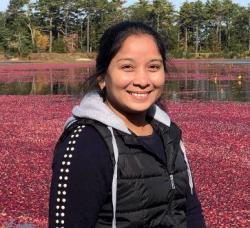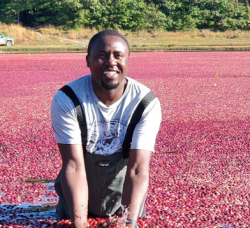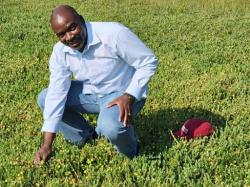A UMass Amherst research team is set to receive $1.19 million as part of a larger $4.1 million grant, funded by a USDA-NIFA (U.S. Department of Agriculture–National Institute of Food and Agriculture) Specialty Crop Research Initiative Grant.
Cranberry farming is woven into the history and economy of Massachusetts. Cultivation of the native crop began centuries ago and to this day, it supplies the income for many growers and is an important export, with Massachusetts being #2 in cranberry production nationwide. However, since the early 1900s, cranberry fruit rot (CFR) has threatened the cranberry industry and its detrimental impact on fruit quality.
Today, cranberry growers are confronted with new challenges: substantial shifts in climate patterns, longer growing seasons, warmer winters, and an increase in rainfall events. In the future, a changing climate will continue to influence the success of cranberry farming. Stricter regulations imposed by export markets has caused the industry to grapple with the loss of commonly used chemistries and fungicides. This has led to a surge in cranberry growing costs, increased fruit rot, and a decline in both yield and fruit quality.
UMass Amherst Cranberry Station researchers Dr. Leela S. Uppala, Dr. Giverson Mupambi, and Dr. Peter Jeranyama, are working with Dr. Jill Fitzsimmons from the UMass Amherst College of Social and Behavioral Sciences, on sustainable solutions to address fruit rot and reduce the threat to the cranberry production in Massachusetts.
The effort in Massachusetts is part of a larger endeavor that has brought together a diverse and multidisciplinary team of scientists, encompassing Plant Pathology, Plant Physiology, Molecular Biology, Plant Breeding and Genetics, and Behavioral Economics. The University of Wisconsin Madison is leading the initiative, in collaboration with Rutgers University, the University of Oregon, the United States Department of Agriculture-Agricultural Research Servi ce researchers, and Ocean Spray Cranberries, Inc.
ce researchers, and Ocean Spray Cranberries, Inc.
The primary objective is to assess the dynamics of fungal pathogens causing CFR while examining the influence of environmental stress on disease manifestation. The overarching aim is to pinpoint stress-tolerant traits and CFR resistance mechanisms for potential crop enhancement. Additionally, this project aims to gain insight into the decision-making process of growers, as they strive to strike a balance between business and environmental considerations. This understanding will pave the way for the widespread adoption of best management practices for effectively addressing CFR.
Dr. Leela S. Uppala, who is based at the UMass Cranberry Station emphasizes that CFR is a disease complex associated with over a dozen fungal species, resulting in a formidable management challenge. A wide range of factors has exacerbated the complexity of managing CFR.
Dr. Uppala and her postdoctoral research associate Dr. Salisu Sulley will delve into characterizing fungi associated with CFR in Massachusetts cranberry bogs. They will also study how sensitive certain CFR fungi are to a range of fungicides, tracking when this resistance emerges.
Dr. Giverson Mupambi, an Extension Assistant Professor at UMass-Cranberry Station, is a recognized leader in Cranberry Physiology and Fruit Quality Research. Dr. Mupambi suggests that excessive solar radiation can harm cranberries’ defense system, making it more vulnerable to CFR. Mupambi and his postdoctoral research associate Dr. Brian Makeredza are set to conduct experiments to better understa nd this phenomenon.
nd this phenomenon.
Dr. Peter Jeranyama, an Extension Associate Professor stationed at UMass-Cranberry Station understands the significant influence growers' fertilizer choices have on both CFR incidence and fruit quality. Notably, he aims to investigate how the excessive application of nitrogen (N) fertilizers can increase CFR and diminish fruit quality.
Dr. Jill Fitzsimmons, Assistant Research Professor in the Department of Resource Economics will evaluate potential trade-offs that growers face to best manage CFR, and identify factors that influence their decisions to implement certain management practices. Potential trade-offs could include long and short-term costs, labor-intensive interventions, marketing opportunities, and environmental impacts. Dr. Ftizsimmons will use her findings to make recommendations to policymakers and stakeholders in order to support the cranberry industry under increased market and climate pressures.
